No edit summary |
(Adding categories) |
||
| Line 78: | Line 78: | ||
[[Category:Musicians, Poets & Artists]] |
[[Category:Musicians, Poets & Artists]] |
||
[[Category:Credited Characters]] |
[[Category:Credited Characters]] |
||
| + | [[Category:House Plantagenet]] |
||
Revision as of 01:40, 6 November 2014
"Those of vile birth- lawyers, university men, macchiavellians- will one day not just usurp the nobility of this realm, but destroy us... and I hate them all." -Henry Howard

Henry Howard, Earl of Surrey
Sir Henry Howard is Earl of Surrey and the eldest son of the Duke of Norfolk during Season Four of The Tudors; he is therefore also a first cousin of both Katherine Howard (though he refers to her as his niece) and Anne Boleyn. Like many nobility, Howard is usually referred to by his title of "Surrey" rather than his name. He is also a descendant of the Plantagenet royal line, whose dynasty was usurped by King Henry's Tudor dynasty.
An arrogant, brutish, ambitious and militaristic nobleman, Surrey nonetheless has a strong code of chivalry and is a dedicated poet. His deep-rooted contempt for 'new men' of lower noble birth, especially the Seymour brothers, makes him many enemies at court (including Bishop Gardiner), although Henry initially shows him favor because of his connection to Queen Katherine Howard; he is also popular among the old noble families that Henry had mostly displaced. Surrey later plays a prominent role in the Siege of Boulogne, but is ultimately relieved of his command after leading a rash attack on the French, primarily due to the machinations of his arch-rival Edward Seymour, Earl of Hertford.
In a bid to restore his power, Surrey foolishly and impulsively makes a plot to capture the young Prince Edward Tudor once Henry dies, unwilling to let the throne pass to the low-born Seymours. He is quickly found out, arrested, and despite a lack of evidence, found guilty and executed in episode 4.09. He is played by Scottish actor David O'Hara.
Season One
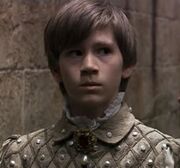
Henry Howard as a boy
Henry Howard is briefly seen in episode 2.02 as an adolescent boy with his father the Duke of Norfolk; he is on his way to see King Henry, who is apparently his godfather. When Charles Brandon approaches them, he implicitly threatens the Duke's son's future if he does not find the Duke of Buckingham guilty in the upcoming trial.
Season Four
Surrey is first seen as an adult in episode 4.01, greeting King Henry and his new Queen, Katherine Howard, whom he identifies as his 'neice' (though she's actually his cousin, he probably says neice because of the age difference). The Earl has apparently been in France 'practicing his chivalry' but the looks he gives some of the court are ominous. When he later talks with Charles Brandon, Duke of Suffolk, Surrey explains that he finds Henry's court full of 'mean creatures, and men of vile birth' whom he sees as displacing the rightful noble blood (and, ironically, he is speaking to one of those 'mean creatures', though oddly Charles doesn't seem offended). Charles asks him what his ambitions are, and Surrey says he intends to surpass the achievements of his father and grandfather. Charles remarks that that is very ambitious, and Surrey replies with a cold smile, "I am a Howard, Your Grace- it is expected of me." Despite this, Charles and Surrey seem to form an odd friendship through the course of the Season.
However, Surrey quickly arrouses the ire of Edward and Thomas Seymour, who cannot fail notice his open contempt for them. Surrey's hatred stems not only from their low noble rank, but also from the fact that they profited from "the murder of the innocent", which likely refers to Surrey's ill-fated cousins George and Anne Boleyn. The Seymours are also disgusted by Surrey's boorish behavior, wandering among the common folk and flounting his superiority (sometimes through violence)- which briefly gets him arrested, though the King releases him conditionally.
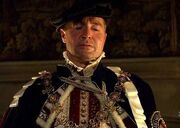
Surrey wears the regalia of a Knight of the Garter
Bishop Gardiner and Wriothesley also suspects Surrey of heresy since he eats meat on Sundays (though the Howards were well-known for their Catholicism) but is unable to interrogate him because he carries the King's favor. The Seymour brothers are later forced to condescend to Surrey in episode 4.03 when Henry gives him the prestigious honor of Knight of the Garter. Surrey also makes a pass at Edward's wife Anna, who (though having very litte affection for her husband) eventually rebuffs him, causing him to extend his contempt to her. After he writes a poem derisively referring to Anna as a she-wolf (since the Seymour crest is a wolf) Anna tells her husband to humiliate Surrey if he gets a chance. The Earl of Hertford sees it as more profitable to work with Surrey as long as he has the King's favor, but admits he will look for an opportunity if it comes.
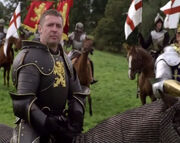
Surrey as Marshall of the Field, alongside King Henry (obscured) arriving at Boulogne
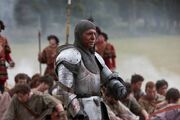
Surrey after his victory at the Battle of Solway Moss (with Scottish prisoners visible behind him)
When the Scotts begin warmongering on the English border, Henry orders Hertford to send Surrey to deal with them, as Surrey has military experience and does not shy away from using brutal tactics. He is quickly successful, defeating a Scottish force at Solway Moss and capturing several of their nobles (whom he treats with surprising dignity); at the same time, the Scottish king dies, leaving his throne uncertain and the Scotts desperate for peace. Because of his victory, Surrey escapes Henry's wrath when Katherine Howard is found guilty of adultery and beheaded in episode 4.05; he watches her mere feet from her chopping block, a cold and indifferent look on his face.
When Henry goes to war with France, he names Surrey Marshall of the Field, alongside Charles Brandon as Commander of the Army; the warmongering Surrey is as eager to do battle as the King. However, he soon becomes frustrated by the continuous siege warfare at Boulogne, demonstrating genuine concern when many English soldiers die of the flux and food becomes short. He confesses to Charles that Henry's explosives expert seems to have designs that are too fantastical to be true. Surrey and a group of his men get caught in an ambush in episode 4.07 when they attempt to thwart a French breakout, although Charles soon arrives with reinforcements; he fights savagely despite being outnumbered, killing many of the French troops.

Surrey with King Henry (left) observing the Siege of Boulogne
Despite the English being unable to continue toward Paris after Boulogne falls, Henry names Surrey military commander of Boulogne, a decision Charles Brandon clearly feels is foolish. Although he likes Surrey, he realizes that having such an aggressive, impulsive nobleman in charge of a weakly-held fortress is not a good idea. Meanwhile, Earl Hertford deliberately withholds reinforcements from Surrey (he is secretly trying to secure a peace treaty with France on Henry's behalf, which hinges on Boulogne being returned to France). This finally gives him a chance to oust his rival when Surrey leads an impulsive, failed attack on the French that costs the English 600 men, including most of the officers who were (oddly) on the front line.
Surrey is withdrawn from the battlefield and questioned on his actions; he angrily argues the officers were on the front line because they wanted to, that French losses were higher, and that his troops fought bravely and could have won if they had been given reinforcements. It makes no impression on his enemies the Seymour brothers or Bishop Gardiner (another enemy since he suspects Surrey of being a Protestant), who bluntly state that it was an unaffordable defeat and relieve him of command, also revoking his Order of the Garter because he was forced to flee the battlefield. Surrey smugly says the King will reinstate him once they've spoken, only to learn that Henry is refusing to grant him an audience. Charles later reassures him that he still remains a powerful nobleman and can regain his honor, but Surrey replies that he is a man of action and vengeance, and he will not be quelled.
In episode 4.09, Surrey is shown talking with a group of men about how, after King Henry's death (which is not far off), they will aproach Windsor Castle (Prince Edward Tudor's residence) and overcome the guards. He says they will 'remove' the Prince to use as a bargaining chip. It is clear Surrey is drawing on his Plantagenet ancestry to secure his own claim to the throne, like the Duke of Buckingham before him However Surrey is soon arrested at court and put in the Tower on suspicion of treason. Surrey very nearly escapes his cell via the cistern, but is recaptured just as he is attempting to open it.

Surrey is arrested on suspicion of treason
He is taken to a court presided over by his enemies, accused of treason on two counts: willingly bearing the arms of Edward the Confessor, and escaping from prison. Proudly, Surrey declares, "I put on my coat of arms only that which I am entitled to." which gets cheers from the assembled nobles around him. Despite clearly being guilty, Surrey makes a convincing and charismatic argument, declaring that the King's purging of the old noble houses will be to England's ruin; he clearly makes a favorable impression on the jury. However, Henry is incensed at the (unclear) plot by Surrey to sieze his son, and with Edward Seymour browbeating the jury foreman he found guilty and sentenced to death by hanging, drawing and quartering. Surrey halts the shouts of protest at this verdict and proudly denounces his enemies; his voice can be heard reading one of his sonnets as he strides fearlessly out of the court under guard, with Charles Brandon watching him sadly.
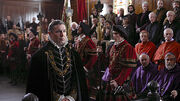
Surrey at his trial
Brandon showed anger towards Edward Seymour in the subsequent episode (4.10, the series Finale) for "hounding poor, proud Surrey to his death" though he acknowledges that it was Surrey's fault for being so impulsive after being relieved of his command at Boulogne. Henry Howard's son became the Duke of Norfolk, like his grandfather; however, he was accused of plotting with Mary Queen of Scotts to overthrow Queen Elizabeth Tudor, King Henry's daughter, and like his father he was executed.
Quotes
"The Happy Life, be these, I find: / The riches left, and not got with pain / The fruitful ground, the quiet mind / The equal friend, no grudge nor strife / No charge of rule, nor governance / without disease, the healthful life / with wisdom, joined with simplicity / am I discharged of all care, the quiet mind." - one of Surrey's poems, as read by Charles Brandon